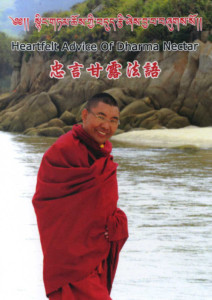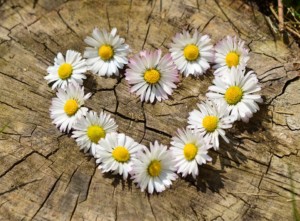Heart Advice Teaching Series
 Join us for a series of one-hour teachings given by Khenpo Karten Rinpoche based on his booklet “Heartfelt Advice of Dharma Nectar.” The series will follow Saturday meditation sessions and serve as drop-in courses for anyone interested in practical ways to apply Dharma teachings to busy western life. No registration required. Rinpoche teaches in his English directly, without the aid of translation. Suggested donation of $10.00, but no one will be turned away for lack of funds. We hope you join us!
Join us for a series of one-hour teachings given by Khenpo Karten Rinpoche based on his booklet “Heartfelt Advice of Dharma Nectar.” The series will follow Saturday meditation sessions and serve as drop-in courses for anyone interested in practical ways to apply Dharma teachings to busy western life. No registration required. Rinpoche teaches in his English directly, without the aid of translation. Suggested donation of $10.00, but no one will be turned away for lack of funds. We hope you join us!
Public Talk: Developing the Supreme Good Heart
Saturday, April 8
11:15am-12:15pm
Manjushri Dharma Center
“The tracks left by all Buddhas, past, present and future; Quintessence of the 84,000 Teachings are the instructions on altruistic Bodhicitta; Don’t forget them. Practice them! That is my heart advice.” page 9 Heartfelt Advice of Dharma Nectar, Khenpo Karten Rinpoche
The supreme good heart, or Bodhicitta, is a precious mind that cherishes all living beings over oneself–altruism in its deepest and broadest form. As the Dalai Lama says in a 2015 video, “Whoever generates this altruistic intention will find themselves setting out on the path to true happiness.” Letting go of ego-clinging that seeks only the happiness of the self, and developing a mind that wishes for the happiness of all creates peace of mind and joy for the practitioner. The benefits of cultivating this attitude are profound: from better health and more harmonious relationships, to the ultimate liberation of enlightenment. Join Khenpo Karten Rinpoche as he teaches on the many benefits of Bodhicitta, followed by a discussion on practical ways to gently encourage the supreme good heart in ourselves.
Upcoming Heart Advice Teachings

Learning to Check Our Actions–Countering the Inner Delusions
2017 date TBD
Preparation, Practice, Dedication–The Power of the 3 Points
2017 date TBD
In Praise of Humility
2017 date TBD
Transforming Adverse Conditions
2017 date TBD
PAST HEART ADVICE SERIES TEACHINGS
This Precious Human Life
Was held on: Saturday, October 8th
11:15am-12:15pm
Manjushri Dharma Center
“This precious human life, like a boat, is found but once and not repeatedly. Don’t be slow to take the boat across the terror filled ocean of samsara! That is my heart advice. When we’ve attained this excellent basis, so difficult to find, if we throw it away in meaningless, harmful conduct, we are trading gold for worthless rocks. Don’t waste this life! That is my heart advice.” pages 3-4 of Heartfelt Advice of Dharma Nectar by Khenpo Karten Rinpoche.
From a Buddhist perspective, we have hit the jackpot by being born human. We have just enough suffering to make us long for a more stable happiness, and just enough freedoms and endowments to allow us to pursue spiritual transformation. By understanding the true rarity of our precious human life, we can begin to make each day, each hour worthwhile. Every single moment of our precious human life has great meaning. We learned in this teaching that impermanence is very much part of understanding our motivation to not waste this life. We learned that samsara is cyclic existence pervaded by suffering, and that to become free from samsara, we must understand our good fortune in being born human, and make the most of our lives.
“Every day, think as you wake up, today I am fortunate to be alive, I have a precious human life, I am not going to waste it. I am going to use all my energies to develop myself, to expand my heart out to others; to achieve enlightenment for the benefit of all beings. I am going to have kind thoughts towards others, I am not going to get angry or think badly about others. I am going to benefit others as much as I can.” Quote from H.H. The Dalai Lama
The Power of Good Intentions
Was held on: Saturday, November 5th
11:15am-12:15pm
Manjushri Dharma Center
“A son of the incomparable Shakyas said, ‘If intentions are good, the path and destination will be good, but if intentions are bad, the path and destination will be bad.’ Call up good intentions! That is my heart advice.” p.4 Heartfelt Advice of Dharma Nectar by Khenpo Karten Rinpoche
One of the most practical ways to apply Dharma to daily life is through the setting of good intentions and checking our motivations and intentions throughout the day. Are we wishing others well in this moment? Do we wish to do no harm, have no enemy, and hold compassion in this moment? The practice is not one of being hard on oneself, nor is it meant to control externalities. It is a gentle yet profound self-reflective practice. We can gradually and gently train our mind to hold positive intentions at all times, even in times of mental distress, which has immense benefits for both ourselves and others. We learned from Rinpoche that good intentions are what Tibetan Buddhists call having a good heart. As practitioners we learn not to see with our eyes, but always through our heart. We learned that part of the text refers to present and future lives–the “path” refers to the present life, and the “destination” refers to future lives. If we learn to be self-aware, to always be in touch with what our intention is in each moment, and to guide those intentions towards love, compassion, forgiveness, and humility, we will enjoy both present happiness, and happiness in our future lives.
The Mind is King
Was held on: Saturday, December 10th
11:15am-12:15pm
Manjushri Dharma Center
“Mind is the king, with power over all. The body is the slave, whether of virtue or vice. Not emphasizing ‘imitation virtue’ of body and speech, always watch your mind. That is my heart advice.” p.5 Heartfelt Advice of Dharma Nectar
In Buddhist teachings, the root of everything is the mind: all happiness and all suffering arise from the mind. No amount of massaging our external circumstances will lead to lasting happiness, and no amount of avoiding unpleasant situations will shield us from suffering. Happiness and suffering are states of mind, therefore their causes are found within the mind. If we train gently and consistently in the cultivation of love, compassion, acceptance, patience, forgiveness, and so forth–these helpful states of mind will lead to lasting happiness, even in the midst of difficult situations. If we are slaves to habitual anger, criticism, blame, jealousy and so forth–these unhelpful states of mind will lead to suffering, even in midst of great material advantage. Come and join us to learn how “mind is king.”
Buddha Nature
Was held on: Saturday, January 7
11:15am-12:15pm
Manjushri Dharma Center
“All beings have Buddha nature. Just as milk is pervaded by butter, when the two accumulations are ‘churned’ with effort at some point Buddha nature will manifest! That is my heart advice. The difference between ‘Buddhas’ and ‘sentient beings’ is whether they have awakened awareness or not. If you don’t cling to them as permanently different, you will find Buddha within! That is my heart advice.” pages 6-7 Heartfelt Advice of Dharma Nectar
On Buddha Nature from H.H.Dalai Lama: “From Buddha’s viewpoint, a human being has—through training, through practice—what we call the highest enlightened mental state. So through practice, a human being, through a sort of purification one’s own mental state, can eventually, finally, become an enlightened one. Even Buddha himself, in order to get final enlightenment, needed hard work. Every sentient being—even insects—have Buddha nature. The seed of Buddha means consciousness, the cognitive power—the seed of enlightenment. That’s from Buddha’s viewpoint. All destructive things can be removed from the mind, so therefore there’s no reason to believe some sentient being cannot become Buddha. Every sentient being has that seed.” Come and learn from Khenpo Karten Rinpoche as he teaches in his own English about the amazing potential all beings have to engage Buddha Nature.
H.H. Dalai Lama quote source: 2010 PBS interview
Abandoning Dualistic Thinking
Was held on: Saturday, March 25
11:15am-12:15pm
Manjushri Dharma Center
“Samsara and nirvana are no more different than the two sides of a single hand. Abandon dualistic discrimination; Pure lands are nowhere else! That is my heart advice.” page 8 Heartfelt Advice of Dharma Nectar, Khenpo Karten Rinpoche
In the introduction to the The Jewel Ornament Of Liberation, Gampopa (1074-1153) writes: “In general, all phenomena are included in the two categories of samsara and nirvana. That which is called samsara is empty by nature, a confused projection. Its defining characteristic is that it manifests as suffering. That which is called nirvana is also empty by nature, but all the confused projections are exhausted and dissipated. Its defining characteristic is freedom from all suffering….When can this confusion be transformed into primordial wisdom? When one attains unsurpassable enlightenment.”
Out of ignorance, we tend to think of samsara and nirvana as two separate realities, when actually they are of the same nature: emptiness, deep freedom and bliss. Samsara is like a dream of mistaken projections. When we awaken from the sleep of ignorance, we will experience the conventional reality as nirvana. It may take a lifetime or many lifetimes to achieve a direct realization of emptiness, but with patient, consistent, gentle and joyful effort, it is within reach.
We can relate to this teaching in another aspect. Within our conventional reality we can observe that we often project mistaken appearances upon external circumstances, based on habits of thought. We automatically judge people and experiences as good or bad, pleasant or unpleasant, and spend much energy trying to avoid the unpleasant, seeking only the people and circumstances we enjoy. What if we could experience others from a basis of curiosity, openness, and freedom of thought? What if we viewed our lives and circumstances beyond the lens of habitual black-and-white thinking?
Rinpoche offered a written version of his teaching: Abandoning Dualistic Thinking
At the meditation class prior to the teaching, Rinpoche offered a video from Sogyal Rinpoche on the Unaltered Mind, which also contributed to the subject of Abandoning Dualistic Thinking.
